
Lay Phyu — Biography
Early Life and Early Exposure to Music
Lay Phyu is one of Myanmar’s most influential rock vocalists and a defining figure in the country’s modern music history. Born in Yangon, he developed an interest in singing at a young age. Music was not his immediate career path, but it became a central part of his life as he matured. Growing up during a period of limited exposure to global entertainment media, he was introduced to rock music primarily through imported recordings and underground sharing among enthusiasts. These early influences shaped his vocal style and artistic direction before he entered the professional stage.
Rise to Fame and Entrance into the Music Scene
Lay Phyu’s public recognition began in the 1990s, when Myanmar’s music industry was undergoing major transformation. Recorded music was transitioning from cassettes to CDs, and live shows were becoming more organized. During this period, Lay Phyu’s strong voice and distinctive delivery helped him rise above many other emerging singers. His performances quickly gained attention among young audiences who were seeking a new sound distinct from traditional Burmese music. His early recordings demonstrated both vocal power and emotional clarity, setting a new standard for the genre.
Role and Significance within Iron Cross
Lay Phyu became widely known as a leading vocalist within Iron Cross, one of Myanmar’s most prominent rock bands. Iron Cross helped define the identity of Burmese rock music for multiple decades. The band’s instrumental style, combined with Lay Phyu’s commanding voice, gave them a reputation that extended far beyond typical pop acts. Iron Cross concerts grew into large cultural events, attended by thousands of fans across the country. Lay Phyu’s association with Iron Cross solidified his position as a central figure in Myanmar’s music evolution.
Within the band, he contributed to memorable live performances and recordings that continue to attract listeners across generations. Iron Cross is regarded not only as a popular entertainment group but also as a symbol of Myanmar’s relationship with global rock culture. Lay Phyu’s role as a frontman gave him a platform to reach nationwide audiences and to inspire aspiring singers who viewed him as a model of vocal discipline and stage command.
Musical Style, Influence, and Artistic Identity
Lay Phyu is known for a deep, powerful voice capable of carrying emotional intensity across live and recorded formats. His musical style draws from both Western rock traditions and Myanmar’s lyrical sentiment. His stage presence is characterized by simplicity and focus; he does not rely heavily on theatrics or choreography, but instead engages audiences through vocal performance and direct emotional delivery.
His influence extends beyond his songs. Younger artists frequently cite him as a key reason they pursued rock or live stage music. Unlike many entertainers whose popularity decreases with age, Lay Phyu maintained relevance through continued performance, consistent vocal practice, and professional conduct. His name remains synonymous with Myanmar rock music, making him one of the country’s most enduring cultural figures.
Public Image, Reception, and Cultural Importance
Lay Phyu’s public image has long been associated with artistic integrity and personal restraint. He is not known for public controversy or scandal, which contributes to his lasting respect among fans and industry peers. His performances draw crowds across different age groups, showing his ability to connect beyond a single generation.
His continued presence in Myanmar’s culture demonstrates the importance of rock music as a medium for expression within the country. At a time when Myanmar faced political and social turbulence, rock music — and Lay Phyu’s presence within it — provided a space for emotional release without direct political confrontation. This indirectly shaped the cultural landscape and allowed expressive art to survive under restrictive conditions.
Legacy and Long-term Contribution to Myanmar Music
Lay Phyu’s legacy lies not only in recorded songs but in the transformation of Myanmar’s live music tradition. Before his era, live performances were generally modest in production. After Iron Cross and Lay Phyu’s emergence, concerts became large, amplified events drawing stadium-level crowds. Today’s live show standards owe much to the expectations set during his peak years.
He remains a defining figure in Myanmar’s cultural memory. His longevity demonstrates what is possible when an artist maintains consistent identity, respects the audience, and adapts without compromising authenticity. For many fans and musicians, Lay Phyu represents the golden age of Myanmar rock and serves as a cultural representative of that era abroad.
FAQ — Lay Phyu
Q1: Who is Lay Phyu?
Lay Phyu is a prominent Burmese rock singer best known for his work as a leading vocalist of Iron Cross and his influence on Myanmar’s modern music scene.
Q2: Why is he considered important in Myanmar music?
He helped popularize rock music in Myanmar, set new performance standards, and inspired future generations of vocalists.
Q3: What is his connection to Iron Cross?
Lay Phyu is one of the most recognized vocalists of Iron Cross, one of Myanmar’s most influential rock bands.
Q4: Is Lay Phyu still active in music?
Yes. He continues to perform and remains a respected figure in public events and the live music circuit.
Q5: What defines Lay Phyu’s singing style?
His style is known for powerful vocals, emotional clarity, and a rock-influenced delivery that blends global music elements with Burmese sentiment.






